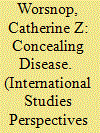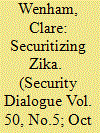| Srl | Item |
| 1 |
ID:
169259


|
|
|
|
|
| Summary/Abstract |
Slow outbreak reporting by states is a key challenge to effectively responding to global health emergencies like Zika, Ebola, and H1N1. Current policy focuses on improving domestic outbreak surveillance capacity globally in order to reduce reporting lags. However, governments also face economic and political incentives to conceal outbreaks, and these incentives largely are ignored in policy discussions. In spite of the policy implications for outbreak response, the “capacity” and “will” explanations have not been systematically examined. Analysis of a dataset coding the timeliness of outbreak reporting from 1996–2014 finds evidence that states’ unwillingness to report—rather than just their inability—leads to delayed reporting. The findings suggest that though building surveillance capacity is critical, doing so may not be sufficient to reduce reporting lags. Policy aimed at encouraging rapid reporting must also mitigate the associated economic and political costs.
|
|
|
|
|
|
|
|
|
|
|
|
|
|
|
|
| 2 |
ID:
148453


|
|
|
|
|
| Summary/Abstract |
Globally gender remains a key factor in differing health outcomes for men and women. This article analyses the particular relevance of gender for debates about global health and the role for international human rights law in supporting improved health outcomes during public health emergencies. Looking specifically at the recent Ebola and Zika outbreaks, what we find particularly troubling in both cases is the paucity of engagement with human rights language and the diverse backgrounds of women in these locations of crisis, when women-specific advice was being issued. We find the lessons that should have been learnt from the Ebola experience have not been applied in the Zika outbreak and there remains a disconnect between the international public health advice being issued and the experience of pervasive structural gender inequalities among those experiencing the crises. In both cases we find that responses at the outbreak of the crisis presume that women have economic, social or regulatory options to exercise the autonomy contained in international advice. The problem in the case of both Ebola and Zika has been that leaving structural gender inequalities out of the crisis response has further compounded those inequalities. The article argues for a contextual human rights analysis that takes into account gender as a social and economic determinant of health.
|
|
|
|
|
|
|
|
|
|
|
|
|
|
|
|
| 3 |
ID:
168492


|
|
|
|
|
| Summary/Abstract |
Brazil’s Zika virus crisis (2015–17), following hot on the heels of the Ebola outbreak (2014–15), dominated newsfeeds and high-level discussions amid governments, the UN system and beyond, with emerging fears relating to Congenital Zika Syndrome (CZS), embodied by microcephaly. However, beyond the ensuing panic in Latin America facing a generation of Zika babies, the outbreak demonstrates key developments in our understanding of the interaction between health and security, based on the Copenhagen School’s securitization approach. It suggests that unlike previous diseases that were securitized, it was not the virus that was the cause of the security threat, nor how many people were affected, but a combined concern over where (in Brazil at a time of domestic political crisis), when (immediately post-Ebola), who (foetuses and babies), how (unknown disease characteristics) and what was the existential threat (the vectorized unknown). This article shows these developments for global health security through empirical analysis of the multiple securitization processes that occurred within Brazil for the Zika virus, at the subnational and federal levels.
|
|
|
|
|
|
|
|
|
|
|
|
|
|
|
|